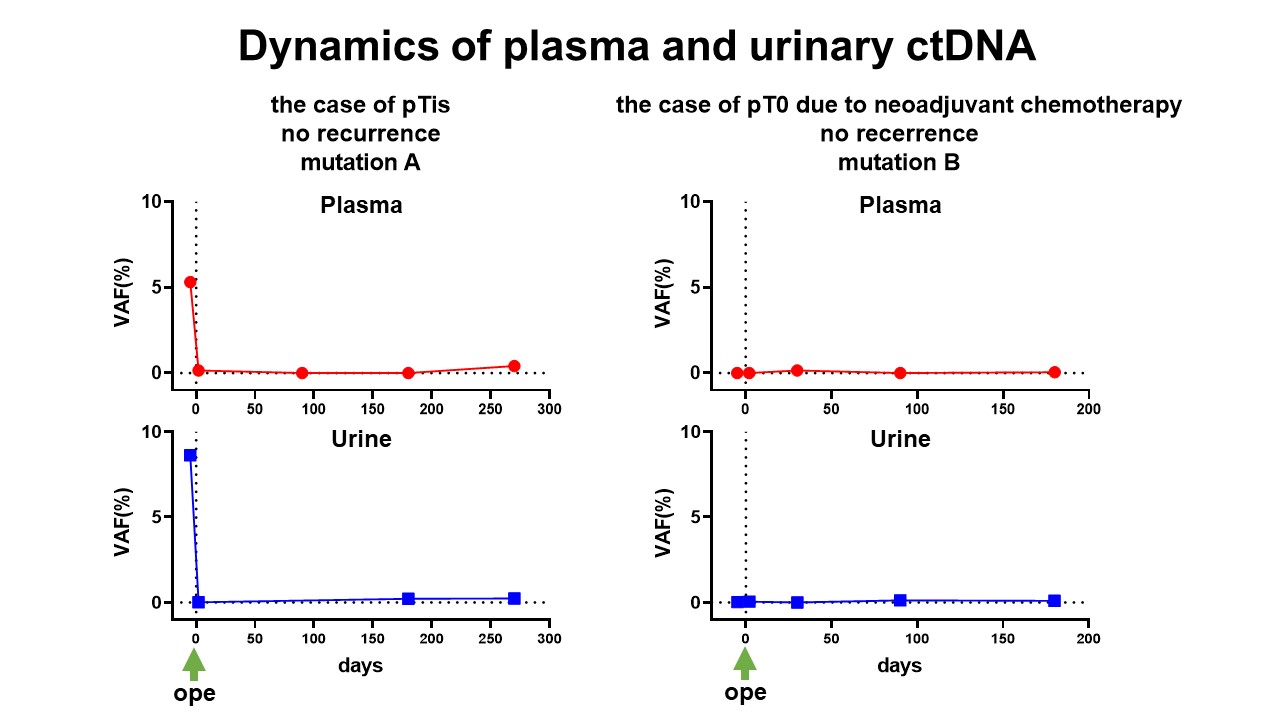Back
Poster, Podium & Video Sessions
Podium
PD58: Bladder Cancer: Upper Tract Transitional Cell Carcinoma II
PD58-03: Detection of individualized mutation using plasma and urinary circulating tumor DNA in patients with upper tract urothelial carcinoma
Monday, May 16, 2022
1:20 PM – 1:30 PM
Location: Room 252
Daichi Tamura*, Masakazu Abe, Renpei Kato, Yoichiro Kato, Shigekatsu Maekawa, Mitsugu Kanehira, Ryo Takata, Yahaba, Japan, Yutaka Suzuki, Kashiwa, Japan, Hidewaki Nakagawa, Yokohama, Japan, Satoshi Nishizuka, Wataru Obara, Yahaba, Japan
- DT
Daichi Tamura, MD
Iwate Medical University
Podium Presenter(s)
Introduction: Upper tract urothelial carcinoma (UTUC) is an aggressive disease which have high recurrence after surgery. Current standard methods for the diagnosis and detection of recurrence are invasive or low sensitivity. Circulating tumor DNA (ctDNA) analysis using digital polymerase chain reaction (dPCR) has demonstrated promising results for monitoring as recurrence in several cancers. The aim of this study was to evaluate the validity of plasma and urinary ctDNA as a tumor biomarker for UTUC among a perioperative period.
Methods: This study included 23 patients who underwent radical nephroureterectomy (RNU) diagnosed as UTUC from January 2019 to December 2020. In each patient, whole exome sequencing (WES) of tumor DNA and corresponding peripheral blood mononuclear cell (PBMC) DNA were performed by next generation sequencer. Tumor specific mutations were identified by comparing the single nucleotide variants from tumors and PBMCs. To investigate ctDNA by dPCR analysis, we designed primers and probes for each mutation. We also obtained plasma and urine ctDNA from each patient. Longitudinal variant allele frequency (VAF) of ctDNA were plot on a perioperative period.
Results: The median age was 71 years old (range 57-82). 13 cases were renal pelvis cancer, and 10 cases were ureteral cancer. The median tumor mutation burden in all cases was 3.02/Mb (range 0.00-15.97). Tumor specific mutations such as TERT, PIK3CA and p53 gene were selected by individualized patient, and performed plasma and urinary ctDNA monitoring by dPCR in 7 patients. Tumor specific mutations were detected in preoperative samples and VAFs of ctDNA decreased quickly after RNU in 5 patients. Tumor specific mutations were not detected in 2 patients who were pT0 due to neoadjuvant chemotherapy.
Conclusions: VAFs in plasma and urinary ctDNA were associated with tumor burden. Individualized ctDNA monitoring could be a useful biomarker for UTUC.
Source of Funding: None

Methods: This study included 23 patients who underwent radical nephroureterectomy (RNU) diagnosed as UTUC from January 2019 to December 2020. In each patient, whole exome sequencing (WES) of tumor DNA and corresponding peripheral blood mononuclear cell (PBMC) DNA were performed by next generation sequencer. Tumor specific mutations were identified by comparing the single nucleotide variants from tumors and PBMCs. To investigate ctDNA by dPCR analysis, we designed primers and probes for each mutation. We also obtained plasma and urine ctDNA from each patient. Longitudinal variant allele frequency (VAF) of ctDNA were plot on a perioperative period.
Results: The median age was 71 years old (range 57-82). 13 cases were renal pelvis cancer, and 10 cases were ureteral cancer. The median tumor mutation burden in all cases was 3.02/Mb (range 0.00-15.97). Tumor specific mutations such as TERT, PIK3CA and p53 gene were selected by individualized patient, and performed plasma and urinary ctDNA monitoring by dPCR in 7 patients. Tumor specific mutations were detected in preoperative samples and VAFs of ctDNA decreased quickly after RNU in 5 patients. Tumor specific mutations were not detected in 2 patients who were pT0 due to neoadjuvant chemotherapy.
Conclusions: VAFs in plasma and urinary ctDNA were associated with tumor burden. Individualized ctDNA monitoring could be a useful biomarker for UTUC.
Source of Funding: None


.jpg)
.jpg)